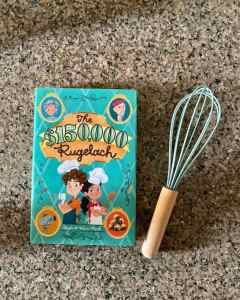Alyson Gerber is one of my favorite middle grade authors (you can tell by the fact that I’ve read all of her books so far). She writes about impactful topics in a sincere, realistic, and immersive way. I can still remember how I felt while reading all of her books (I can remember where I was for each book!) and that’s my definition of a memorable story.
Alyson Gerber’s newest title is about a girl whose mother’s issues with food are starting to affect her. Add puberty, friend drama, and disordered eating, and Sarah is finding it hard to take up space. Alyson and I talk about Taking Up Space, disordered eating, the value of good friends, and why sports show up in all of her stories.
Hi Alyson! It’s a pleasure to chat with you (for the first time!) after reading and LOVING all three of your middle grade books.
Thank you so much for having me. I’ve been following your work since you started reviewing middle grade books and interviewing authors, and I’m so glad to connect with you!

I loved Taking Up Space. Sarah is a pubescent teen dealing with a changing body, and slowly she develops issues with food. Why did you decide to write about disordered eating?
Taking Up Space is based on my disordered eating and my struggle to value myself. For most of my life, I didn’t think I was worth very much at all. I was stuck in a cycle of negative self-talk, restricting food, binging, and dieting. What I went through is shockingly common. More than half of eight-year-olds want to be thinner, and they feel better about themselves when they’re on a diet.
When I was thinking about writing this book and started talking about my experience with disordered eating, I realized that this topic made people feel uncomfortable and ashamed. At the same time, people wanted to talk about everything they were feeling. That’s how I knew I needed to write this book. Adults and kids need to have an honest conversation about how diet culture has been passed down for generations. We all need to talk about the impact it has had on how we feel about food and about our bodies.
We can’t ignore Sarah’s mother’s role in her daughter’s issues with food. At home, food is hard to come by (and not because they’re poor). She even questions Sarah’s choices and (very normal) meal frequency.
I’m really glad you brought up Sarah’s mom. Her character is central to this story. From the start of the book, we see that she has a complicated and painful relationship with food and that her struggle impacts Sarah. Sarah’s mom gives the adult readers, who struggle with food, a way into this story. And her dad is there for readers, who don’t quite get it or can’t relate or are reluctant to acknowledge that diet culture and disordered eating and body image struggles are real problems.
I wrote Taking Up Space to ignite generational conversations between adults and kids about food, eating behaviors, and body image. I want adults, especially educators and librarians, to know that reading and teaching this book does not require you to feel good about your own relationship with food or your body. This story will reassure you that we all—even adults—need support sometimes. It’s okay if you don’t have all the answers and if you feel confused about food. We live in a diet culture that perpetuates fatphobia and anti-fat bias and makes many of us at different times feel ashamed to eat.
This book is an own-voices story , but I also worked with multiple sensitivity readers, including a psychologist and psychiatrist, to make sure that I did everything in my power not to trigger readers. This topic has been off-limits for far too long. Kids are confused. And they don’t deserve to be. Taking Up Space is a chance to bring their fear and pain out into the open, so they can feel seen and heard and validated.
There are so many engaging basketball details in this book that make it a fast-paced, engaging experience to read. Do you have a history with basketball? I remember reading that you played soccer like Rachel, the protagonist in your debut, Braced.
The basketball scenes in this book were so fun to write. I’m really happy you felt they added a layer of excitement to the story.
I played sports growing up, and I loved being part of a team. There’s a special energy, adrenaline, and connection between teammates that I like to revisit in my writing. Unlike with soccer, I never played basketball. But as a kid, I used to go to a lot of Celtics games. And now, as an adult, basketball is very important to my family. My sister-in-law and mother-in-law both played in college. As I was writing the basketball scenes as well as the moments where Sarah and Ryan wrestle with the unfairness in college sports, I thought a lot about my daughter and about the changes I hope to see happen in women’s sport.
Sarah’s friendship with Ryan is a literal lifesaver, as is her relationship with her crush Benny. You’ve mentioned your struggles with food and disordered eating. Did you have any Ryan or Benny in your life?
I definitely had people who were there for me the way that Ryan and Benny are there for Sarah. But it’s really hard to be a good friend to someone in Sarah’s situation. A lot of her problems connect back to her family, so navigating those dynamics can be a lot for anyone at any age. I wanted to shine a light on that difficulty and give readers tools to feel more comfortable handling these situations.
Can we talk about all the yummy food in this book? It’s true, there’s not plenty of that in Sarah’s house, but she and Benny cook up a storm together! Were those scenes tough to write because of your complicated relationship with food? Was it intentional to have those hard food moments with Sarah and her mom and these sweet food moments with Benny almost side by side?
I actually found the scenes where food is hard for Sarah to be the most challenging to write. In different ways and for different reasons, food was hard in my house growing up. Going back to those feelings of confusion and uncertainty was an emotional process. But I also knew that I needed to do that in order to tell this story. I wrote a lot of those scenes first, testing to see if I was ready. And then, when I drafted Taking Up Space, I instinctively placed those sweet food moments side by side with the difficult ones, because that’s what makes food so complicated. It’s intertwined in every part of our daily lives multiple times a day. For people who are struggling, it can feel relentless and unavoidable. And I wanted to show that reality.
Also, a big part of my recovery has been learning how to cook as a way to take care of myself. I enjoyed writing the cooking scenes. I’m proud of how they turned out and what they did for the book.
Sarah deals with issues in her friendship with Emilia that are very true to middle school and general friend drama. I like how realistically you portray friendships in your books. I still vividly remember Clea’s struggles with her friend Red, in Focused. What would you say helps you realistically portray the friendships we forge in these turbulent years?
I’ve always been curious about friendship dynamics and how they impact the way we view ourselves. I spend a lot of time thinking about why each character I’ve developed acts the way they do. I’m especially interested in groups of friends, because I think we are given unrealistic expectations about what it means to be part of a friend group. That setup creates a lot of conflict. And then, puberty raises the stakes.
I would love to hear about some of the recent middle grade books you’ve read and enjoyed recently. Any particularly memorable ones?
I loved One Jar of Magic by Corey Ann Haydu. Also, I really enjoyed City Spies and Golden Gate by James Ponti. And I had the chance to read an early copy of Miositis Flores Never Forgets by Hilda Eunice Burgos, which comes out this fall. It’s such an important and beautiful story.
What do you love to do when you’re not writing?
I love to read and watch mysteries and spend time with my family in Prospect Park. I also love trying new foods from all around NYC. And I’m looking forward to traveling and exploring the world again once it’s safe.
I love that (spoiler!) Sarah gets help. What do you hope Sarah’s story does for anyone dealing with mental health challenges or disordered eating?
Disordered eating isn’t a medical diagnosis, and as a result, it took me a long time to accept that my pain counted and that I deserved support and empathy. My hope is that Taking Up Space helps readers to recognize that they matter and encourages them to ask for help. Everyone deserves to get the help they need.
Thank you so much for chatting with me, Alyson!
Buy Taking Up Space
Meet Alyson Gerber

Alyson Gerber is the author of the critically-acclaimed, own-voices novels Braced and Focused published by Scholastic. Her third novel Taking Up Space will be in stores on May 18, 2021. She has an MFA from The New School in Writing for Children and lives in New York City with her family. Follow her on Twitter and Instagram.
Braced, Focused, and Taking Up Space are all Junior Library Guild Gold Standard Selections. Braced received three starred reviews and has been nominated for state book awards in Oklahoma, Indiana, New Hampshire, Virginia, South Dakota, and Georgia. Focused was picked as a best book of year by The Today Show, Kirkus Reviews, and A Mighty Girl and has been nominated for state book awards in Rhode Island, Oklahoma, and Michigan. Alyson’s latest novel, Taking Up Space, based on her experience with disordered eating, will be published on May 18, 2021. Taking Up Space will help readers recognize how much they matter and see that if something negative is taking up space in their minds, even if there isn’t a name for it, they should ask for help.

More Author Interviews
- Lisa Fipps on Starfish
- Jenn Bishop on Where We Used to Roam
- Rajani LaRocca on Red, White and Whole















This sounds like such an important book! I’ve only read Focused by Gerber, but I will have to get a copy of this one soon.